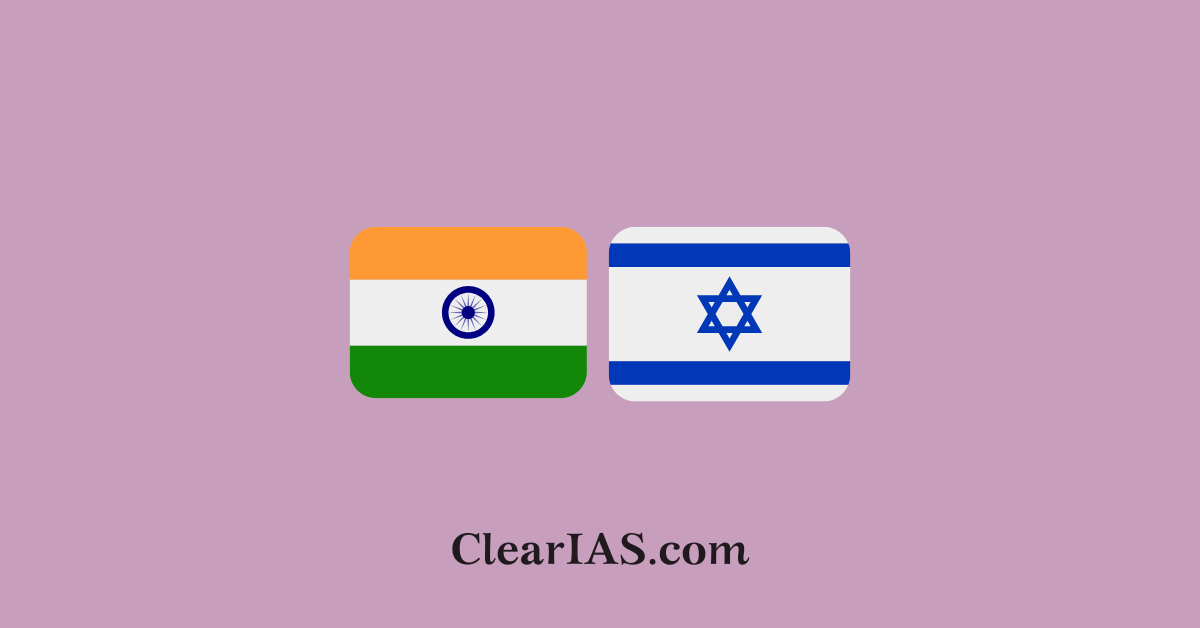
India-Israel relations are multifaceted and began when India recognised Israel in 1950. Read here to learn of the latest developments in the bilateral relations.
In a landmark move, Israel has become the first member of the Organisation for Economic Co-operation and Development (OECD) to sign a Bilateral Investment Treaty (BIT) with India.
The agreement reflects a growing strategic and economic partnership between the two nations, particularly at a time when India is seeking to strengthen its global investment framework and attract more foreign direct investment (FDI).
However, like many of India’s BITs signed in the 1990s, the treaty was terminated in 2017 as India sought to renegotiate its investment treaties under a new model BIT framework adopted in 2016.
Read: India-Israel Special Strategic Partnership
Key Features of the India-Israel BIT
India and Israel established full diplomatic relations in 1992, and within a few years, they signed the Bilateral Investment Treaty (BIT) in 1996 to promote and protect investments between the two nations.
The treaty provided a legal framework that balanced investor protection with host state regulatory powers, while also facilitating trade and capital flows.
- Boost to Investment
- The treaty encouraged bilateral investments, which today stand at USD 800 million in cumulative investment stock.
- Investor Protection
- Provided a minimum standard of treatment to investors, protecting them from arbitrary or discriminatory practices.
- Balanced protection with recognition of the State’s sovereign right to regulate in the public interest.
- Dispute Resolution
- Allowed for investor–state dispute settlement (ISDS) through arbitration, giving investors confidence to invest in each other’s markets.
India-Israel Relations: Historical Background
- Early contacts: India recognised Israel in 1950, but relations remained limited due to India’s pro-Arab policy and support for the Palestinian cause.
- 1992: Full diplomatic relations were established. Since then, ties have expanded rapidly in defence, agriculture, trade, science, and technology.
- India continues to balance its support for Palestine with a growing strategic partnership with Israel.
India-Israel Relations: Strategic & Defence Cooperation
- Israel is among India’s top three defence suppliers.
- Joint projects include:
- Barak-8 missile system (co-developed).
- UAVs, radar systems, and electronic warfare equipment.
- Cooperation on border management and counter-terrorism.
- Regular naval cooperation, with Indian Navy ships calling at Haifa.
- Defence ties have strengthened under the framework of ‘Make in India’ with technology transfer
Evolving India-Israel Relations
Even after the termination of the 1996 BIT, bilateral cooperation between India and Israel has expanded significantly across multiple domains:
- Economic and Trade Relations
- Bilateral trade (excluding defence) stood at USD 6.53 billion in FY 2023–24, with India enjoying a trade surplus.
- Sectors of strength include diamonds, pharmaceuticals, chemicals, agriculture, water management, IT, and renewable energy.
- Indian exports to Israel: diamonds, pharmaceuticals, chemicals, textiles.
- India imports from Israel: diamonds, machinery, high-tech equipment, and defence tech.
- Regional and Multilateral Cooperation
- The I2U2 Partnership (India, Israel, UAE, USA), launched with its first summit in 2022, focuses on food security, renewable energy, technology, and infrastructure development, highlighting Israel’s role in India’s wider West Asia strategy.
- Innovation, Science, and Technology
- The India-Israel Industrial R&D and Innovation Fund (I4F) was renewed for 2023–27 to fund joint industrial research and innovation projects.
- Cooperation in startups, cybersecurity, water desalination, and AI is steadily growing.
- Agriculture and Water Management
- Israel’s expertise in micro-irrigation and water efficiency has helped modernise Indian agriculture.
- Several Centres of Excellence in Agriculture have been set up in India with Israeli support.
- Health, Culture, and People-to-People Ties
- MoUs on healthcare and medicine deepen cooperation in pharmaceuticals and biotech.
- The Cultural Exchange Programme has promoted academic, tourism, and cultural linkages.
- Around 85,000 Jews of Indian origin live in Israel (Bene Israelis, Cochin Jews, Baghdadi Jews, Bnei Menashe).
Significance of the India-Israel Relations
- Defence cooperation enhances India’s security preparedness.
- Agriculture and water technologies support India’s food and water security.
- Science and innovation partnerships boost India’s high-tech ecosystem.
- Political and regional cooperation strengthens India’s position in West Asia.
Challenges in Relations
Balancing West Asia Policy
- India has historically supported the Palestinian cause and maintains strong relations with Arab countries.
- Israel, on the other hand, has conflicts with Palestine and many Arab neighbours.
- India has to carefully balance ties with Israel, Iran, and Gulf states, especially since Gulf countries are vital for energy security, trade, and remittances.
Geopolitical Risks
- Any escalation of conflict in Gaza, Lebanon, or Iran-Israel tensions can put India in a difficult diplomatic position.
- India’s huge diaspora in the Gulf and dependence on oil imports make it cautious in openly siding with Israel during conflicts.
Public Opinion & Domestic Politics
- In India, domestic political sensitivities around Palestine and Muslim community issues sometimes create resistance to closer ties with Israel.
- Pro-Palestinian stances by opposition parties also influence India’s public diplomacy approach.
Technology & IPR Concerns
- Israel is advanced in cyber, water, and agri-tech, but is often reluctant to transfer core technologies without strong intellectual property protections.
- India seeks joint R&D and manufacturing, but negotiations over technology transfer and pricing remain sticking points.
China Factor
- Israel has growing technology and infrastructure links with China, which India views with suspicion.
- This sometimes creates friction, as India would prefer Israel to prioritise ties with like-minded democracies.
Conclusion
India and Israel enjoy a strategic, time-tested partnership built on trust in defence, innovation, and agriculture. But for the relationship to reach its full potential, both countries must navigate geopolitical sensitivities in West Asia, balance economic expectations, and manage third-party influences.
The termination of the 1996 India-Israel BIT marked a shift in India’s investment treaty policy, but it has not slowed the momentum of bilateral cooperation.
Instead, ties have diversified into trade, innovation, defence, agriculture, and regional partnerships, making Israel a strategic partner in India’s growth story.
Going forward, a new, balanced BIT aligned with India’s 2016 model could provide greater legal certainty to investors while safeguarding regulatory autonomy.
Such a framework would complement the growing political, economic, and strategic trust between the two nations, ensuring that the partnership continues to thrive in the 21st century.
Related articles:






Leave a Reply